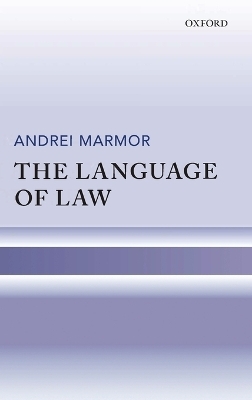
The Language of Law
Seiten
2014
Oxford University Press (Verlag)
978-0-19-871453-8 (ISBN)
Oxford University Press (Verlag)
978-0-19-871453-8 (ISBN)
Employing recent advances in philosophy of language to elucidate key aspects of legal communication, this volume examines how the language of legal directives can determine the content of the law, thereby enabling a better understanding of the boundaries between normative and linguistic determinants of legal content.
The close connection between philosophy of language and philosophy of law has been recognized for decades through the work of many influential legal philosophers. This volume brings recent advances in philosophy of language to bear on contemporary debates about the nature of law and legal interpretation.
The book builds on recent work in pragmatics and speech-act theory to explain how, and to what extent, legal content is determined by linguistic considerations. At the same time, the analysis shows that some of the unique features of communication in the legal domain - in particular, its strategic nature - can be employed to put pressure on certain assumptions in philosophy of language. This enables a more nuanced picture of how semantic and pragmatic determinants of communication work in complex and large-scale systems such as law.
Chapters build on explanations of key elements of statutory language, such as the distinction between what is said and what is implicated, the possibility of ascribing truth-values to legal prescriptions and the structure of legal inferences, the various forms of vagueness in the law, the distinctions between vagueness, ambiguity, and polysemy in legal language, and the distinction between concept and conceptions, mostly in the context of constitutional interpretation. The book demonstrates that paying close attention to the kind of speech acts legal directives are, and how they determine the content of the law, enables a better understanding of the boundaries between normative and linguistic determinants of legal content.
The close connection between philosophy of language and philosophy of law has been recognized for decades through the work of many influential legal philosophers. This volume brings recent advances in philosophy of language to bear on contemporary debates about the nature of law and legal interpretation.
The book builds on recent work in pragmatics and speech-act theory to explain how, and to what extent, legal content is determined by linguistic considerations. At the same time, the analysis shows that some of the unique features of communication in the legal domain - in particular, its strategic nature - can be employed to put pressure on certain assumptions in philosophy of language. This enables a more nuanced picture of how semantic and pragmatic determinants of communication work in complex and large-scale systems such as law.
Chapters build on explanations of key elements of statutory language, such as the distinction between what is said and what is implicated, the possibility of ascribing truth-values to legal prescriptions and the structure of legal inferences, the various forms of vagueness in the law, the distinctions between vagueness, ambiguity, and polysemy in legal language, and the distinction between concept and conceptions, mostly in the context of constitutional interpretation. The book demonstrates that paying close attention to the kind of speech acts legal directives are, and how they determine the content of the law, enables a better understanding of the boundaries between normative and linguistic determinants of legal content.
Professor Marmor concentrates his study on legal and moral philosophy. Marmor is the director of the USC Center for Law and Philosophy, and editor in chief of the Journal of Ethics & Social Philosophy, www.jesp.org. Marmor has published an extensive amount of work, including several books and many articles written on diverse topics in philosophy of law and moral-political philosophy.
Introduction ; 1. What Does the Law Say? ; 2. What Does the Law Implicate? ; 3. Truth in Law ; 4. Varieties of Vagueness in the Law ; 5. Textualism in Context ; 6. Meaning and Belief in Constitutional Interpretation ; Bibliography
| Verlagsort | Oxford |
|---|---|
| Sprache | englisch |
| Maße | 162 x 241 mm |
| Gewicht | 426 g |
| Themenwelt | Geisteswissenschaften ► Philosophie ► Sprachphilosophie |
| Recht / Steuern ► Allgemeines / Lexika | |
| Recht / Steuern ► EU / Internationales Recht | |
| ISBN-10 | 0-19-871453-X / 019871453X |
| ISBN-13 | 978-0-19-871453-8 / 9780198714538 |
| Zustand | Neuware |
| Haben Sie eine Frage zum Produkt? |
Mehr entdecken
aus dem Bereich
aus dem Bereich
Aspekte einer Ontologie des Logos
Buch | Hardcover (2024)
Springer Fachmedien (Verlag)
119,99 €
Wie die Menschheit zu ihrer größten Erfindung kam
Buch | Softcover (2022)
C.H.Beck (Verlag)
18,00 €
Macht und Legitimität politischer Sprache im Prozess der europäischen …
Buch | Softcover (2023)
Nomos (Verlag)
74,00 €


